2016 Novelist Income Results, Part 3: Number of Books Published in 2016
Introduction
This is the third chunk of data and analysis from the 2016 Novelist Income Survey.
A number of people have asked how the number of books published in 2016 correlates with income, particularly with indie writers. We saw in part two that authors who primarily self-publish can do quite well. Is volume one of the secrets to success, and is it a greater factor for indie writers than traditionally the published?
Overview
I used the same method as before for separating out authors who were primarily indie, primarily large press, and primarily small press.
Three survey questions asked how many books respondents had published in 2016 through a large press, a small press, and through self-publishing. This brings me to my first data quandary. When I’m looking at the indie authors, do I count just the number of books they self-published, or the total number of books? Because a lot of our authors are hybrid, those numbers won’t be the same. So I graphed the data both ways, and found that the results — particularly the trend line — looked pretty much identical.
I decided to go with the total number of books published in any category, and to see how that number affected income for authors who were primarily indie, small press, or large press.
I removed the highest outlier from each graph below, both because it appeared to be disproportionately influencing the results, and because it threw off the scale and made it harder to see the rest of the data points. Because this was using net income, I also removed the handful of authors who didn’t report any expenses, since I had no way of calculating those net incomes.
The Charts
Indie Authors:
Small Press Authors:
Large Press Authors:
Everyone’s clear on the correlation =/= causation thing by now, right? That said, the trend lines on the three graphs are pretty striking. For authors who are primarily indie, the graph suggests a correlation between number of books published and overall income. The correlation for small press is significantly smaller.
But most fascinating to me is that for large press authors, the line is essentially flat. The authors with 8 or 10 large press novels in 2016 made roughly the same as the average author with 1 or 2 large press books. Excellent news for the one book/year folks with big publishers.
Median and Average Books/Year
As I was wrapping up, it occurred to me that I should compare how prolific the different types of author were. This turned out to be interesting as well, though not too surprising.
Books Published in 2016: Median (Average)
- Large Press 1 (1.2)
- Small Press 1 (1.3)
- Indie Press 2 (3.1)
While the median large and small press author published one book last year, the median indie published two. The difference in the average numbers is even stronger.
There are exceptions to everything, of course. I know some ridiculously prolific and successful big-press authors. But overall, I think this supports to the idea that success in self-publishing depends more strongly on how many books you can put out. It also shows that indie authors are following that approach and getting more books out there.
Net Losses
One last note. (Or maybe just one last excuse to post a pie chart.) 63 authors reported a net loss in 2016. 36 of those were indie authors. 19 were small press. 8 were large press.
Intuitively, this makes a kind of sense. Self-publishing requires the author to invest in the up-front production costs, as well as marketing. But I’d want to collect a lot more data than I have before coming to any firm conclusions.
In Our Next Episode
I’m very curious to look at the hours/week spent on promotion and marketing, and to see how much that correlates with income. In other words, does all that work we do trying to get our names out there really have an impact? (I’m guessing the answer may be very different depending on whether or not you’re large press, small press, or indie.)






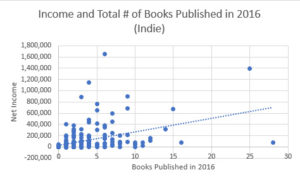
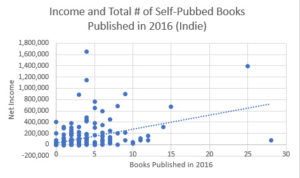
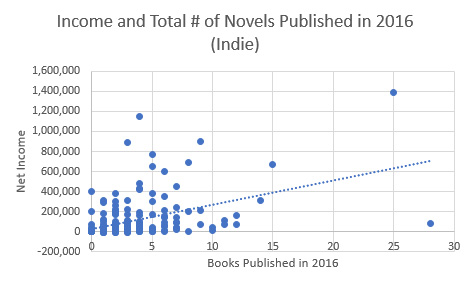
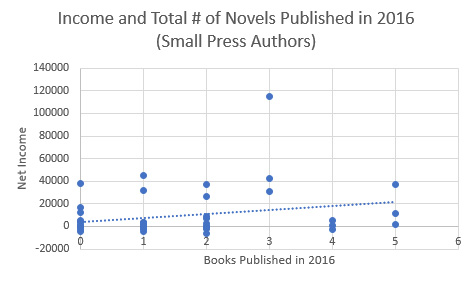
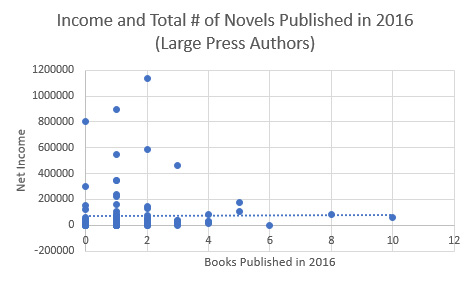
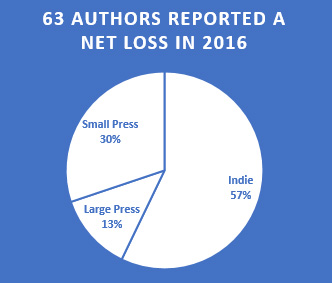
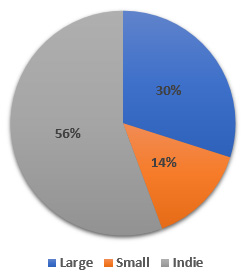
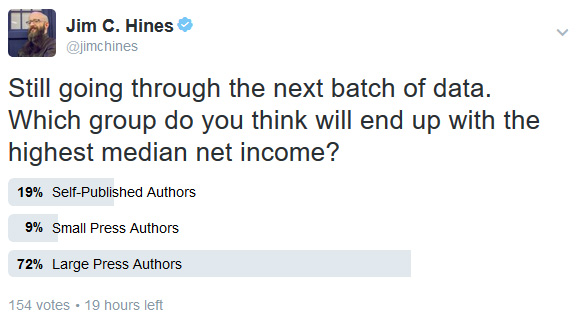
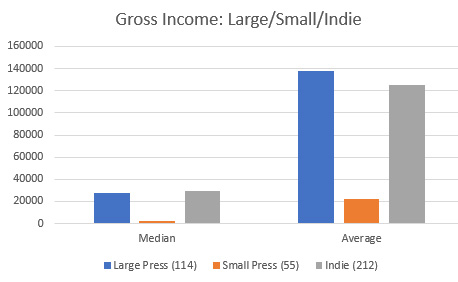
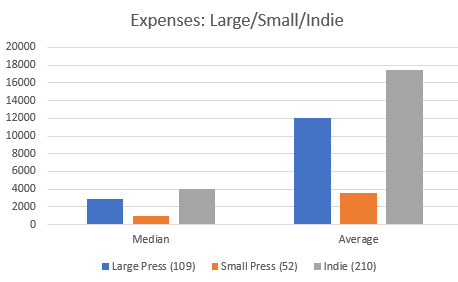
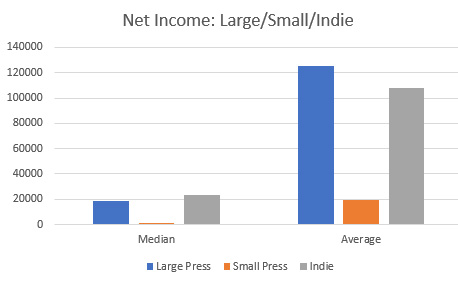

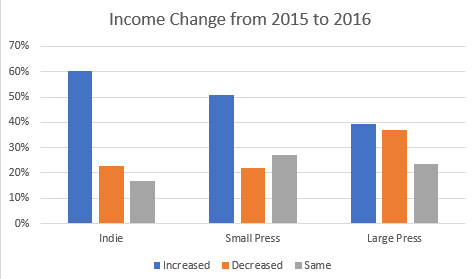
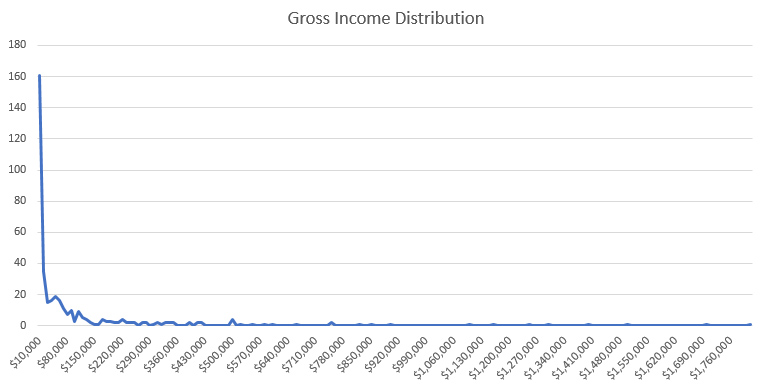
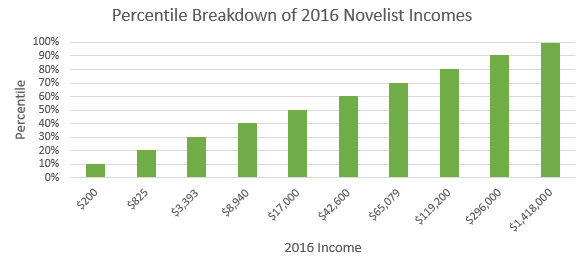
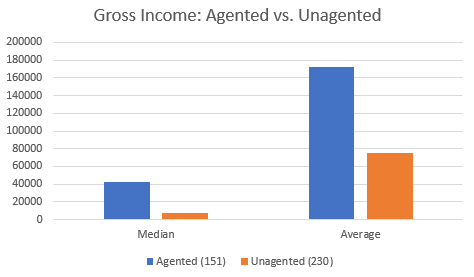
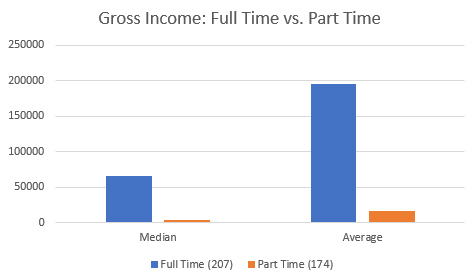
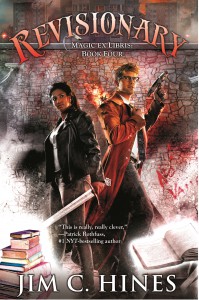 But since it is February, that means it’s only five days until Revisionary comes out in paperback. The release of the mass market edition means the price of the ebook should drop as well, which I know some people have been waiting for.
But since it is February, that means it’s only five days until Revisionary comes out in paperback. The release of the mass market edition means the price of the ebook should drop as well, which I know some people have been waiting for.